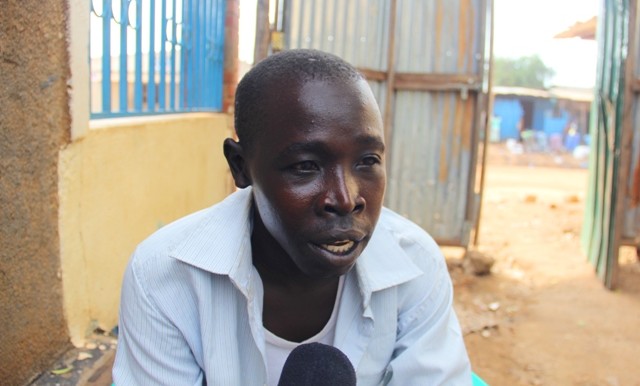Wounded in War: injured soldier struggles to pay for treatment

Wounded in War is an exclusive Radio Tamazuj series that tells the stories of soldiers and civilians injured in South Sudan's civil war. If you know a wounded person who would like to share their story with Radio Tamazuj, please fill out this contact form.
Emmanuel Jimmy Robert was on duty at the Giyada Military Headquarters when the civil war broke out in Juba on 15 December.
Bullets started flying from all directions, Jimmy says, but his commanding officer told him to stand his ground.
Suddenly he felt a pain in his stomach and fell. Jimmy had been shot. His comrades pulled him under a tank for shelter.
Thankfully, the wound was not fatal, and Jimmy was taken to Juba Teaching hospital for treatment. After two months in the hospital, Robert recovered and was released.
But now Jimmy faces another challenge. He can’t afford to pay his hospital bills, and South Sudan’s government refuses to compensate him.
“My accident happened in the hand of the government when I was in the duty, and my family is not supposed to pay for my medicine,” Jimmy says.
Jimmy says the government did not pay any of his medical costs while he was in hospital, and won't pay for him to travel abroad for further treatment.
Jimmy says a doctor in Juba recommended he travel to another country for a CT scan, a medical test unavailable in South Sudan.
“I don’t know what will happen to myself later because my stomach needs more examination. Up to now as you can see me and my stomach, it is still needing more scanning and further examination from the outside hospital, in which I could not be possible to get the money,” Jimmy says, showing a deep scar on his stomach.
Jimmy says that each time he goes to his division in Giyada and asks for money the officer in charge tells him to come back the next day.
Robert’s father Silverton Thomas, former Dean of All Saints Cathedral Church in Khartoum, says that he wrote an application to the government requesting money for his son to receive treatment in Khartoum or Egypt.
“But this has not happened,” Thomas says. “[My son] needs a specialist to go over with a major operation again.”
Jimmy says it was only his family that kept him alive by helping pay for his medication and praying for him. He worries about what will happen to his family if he can’t get the treatment he needs.
“It is the government who can pay all the cost of the treatment,” he says. “And if I die, my family, especially my young four children, will suffer in the future.”
Photo: Emmanuel Jimmy Robert speaks to Radio Tamazuj.
For breaking news updates from Radio Tamazuj ‘like’ our page on Facebook, follow us on Twitter, or subscribe to our RSS feed.